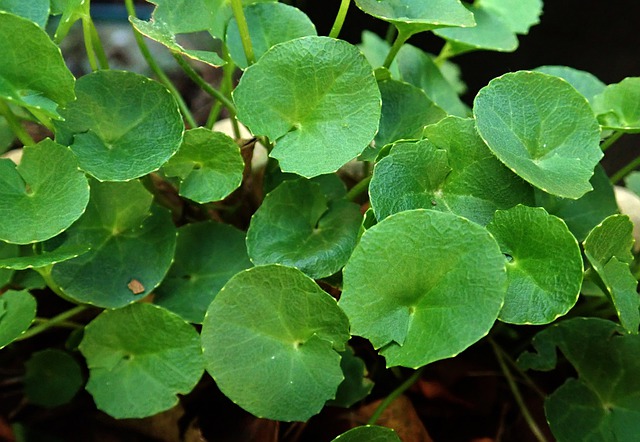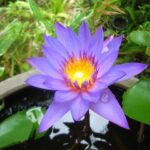Gotu Kola - Centella asiatica
Gotu Kola and I have been friends for many years. Yet, it’s just over the last few months that I have really come to appreciate the way it sooths and calms the mind and body, while at the same time encouraging equanimity, clarity, and focus. It has been, and continues to be, a strong ally in my healing from the brain injury I sustained in March. But more than helping me feel calm and ok with life, this great friend works to decrease inflammation and increases growth and rejuvenation of brain cells. Plus, it helps increase the ability of my brain cells to become more versatile in their functioning (called neuroplasticity).
I don’t want to sell Gotu Kola short. Its actions work more than on the brain. Like most herbs it has a wide range of actions and uses.
Let’s go exploring.
About Gotu Kola
Family -A member of the Apiaceae or Umbelliferae family, also known as the carrot or parsley family.
Gotu Kola, is a native to the warmer areas of India, China, Africa, Asia, northern Australia, Central America, and the southern United States. It has been used for 1000’s of years and is well-studied by our modern medical researchers. Most of the traditional healing wisdom of this plants come from the India’s Ayurvedic tradition and Traditional Chinese Medicine.
Description
Gotu Kola is a low growing, water-loving herb that grows as a perennial in warmer climates and an annual in more temperate areas. It seems to do equally well in sun or shade and propagates itself most readily by re-rooting at leaf intersections or nodes, creating a thick mat as high as 4 to 18 inches.

Slender stems support bright green leaves thought to resemble the human cerebellum, an indication of its use as a brain tonic. The flowers are small and white to purple.
This is an easy plant to grow. It likes the heat of a green house, but also does well as a potted plant, inside or out. I haven’t planted it as an annual in the garden, but I imagine it would do well there too. In my experience plant starts are the way to go. I usually purchase mine from Strickly Medicinals. They say the seeds can be hard to get going and can remain dormant for many years.
The Names of Gotu Kola
Gotu Kola is reported to have over 60 different names from all over the world. Some of its well-known names include Brahmi, Kula Kud (India), Asian marsh pennywort, pennywort, Centella, Fo-Ti Tieng (Chinese for “elixir of life” or “herb of longevity”). In the Sri Lankan Singhalese language, Gotu Kola means cup-shaped leaf.
About the name Brahmi
The Sanskrit word Brahmi comes from the Vedic tradition of India. It means, “that which gives knowledge of Brahman, or supreme reality.” Three main herbs, all from the Indian subcontinent, are given this designation, Bacopa monnieri (Bacopa), Centella asiatica (Gotu Kola), and Manduka Parni. Hydrocotle asiatica (Brahmi) is usually given as a synonym for Centella asiatica (our herb, Gotu kola), but according to Dr. David Frawley in his book, “the Yoga of Herbs,” it is a separate and distinct variety, albeit a close relative of to Gotu kola with very similar actions and uses. Frawley says that Hydrocotle asiatica is less available in commerce and because of the similarities Gotu kola is used in its stead.
It’s quite a controversy. Maybe everyone’s right! Perhaps Brahmi is a class of herbs rather than a specific botanical.
In Ayurvedic medicine, Brahmi is one of the most important herbs, or class of herbs, for the nervous system. One of the best for balancing and rejuvenating the mind, opening the crown cakra and integrating the right and left hemispheres of the brain. Yogis use it to seek deeper states of meditation, while others of us use it in the hopes of long, healthy life, full of happiness and joy.
Medicinal Properties
Nootropic (brain tonic), anxiolytic, nervine, rasayana (rejuvenating tonic), anti-inflammatory, mild adaptogen, anti-depressant, antioxidant, immunomodulator, anti-cancer.
For more information about the definitions of herbal actions click here
Part Used, Preparations and Suggested dosages
The whole plant is harvested when in bloom, then dried or tinctured fresh. Dried plant material can be made into tea, tinctures and oil infusions. Leaves can be eaten fresh anytime, 2 or 3 leaves per day.
Suggested Dose
- Tincture – fresh 1:2 at 70-100% alcohol. Dried 1:4 at 40-50% alcohol. Both 20-60 drops 3x per day.
- Tea – 1tsp dried herb in 8 ounces boiling water. Steep 30 to 40 minutes. Taken internally 4 oz at a time or used externally as a wash.
- Standardized triterpene rich extract 150 to 500 mg per day.
- Infused oil externally (see recipe below)
Medicinal uses of Gotu Kola
Gotu Kola falls into a category of herbs known as nootropics (pronounced no-o-trop-ik). This is important because this, along with its anti-inflammatory action, colors all its uses in the body. Nootropic substances act on the mind. They are “smart” herbs or cerebral stimulants used to improve memory, slow down or prevent age-related cognitive decline and enhance emotional and mental wellbeing. Pretty darned nifty.
Our herb, Gotu Kola has been used for 1000’s of years to improve mental concentration while at the same time promoting relaxation in brain and cerebral tissue, especially when everything is in overdrive and there seems no way to focus. It seems to help slow down “mental chatter” without depressing or sedating effects leaving a sense of peace and harmony.
Actions in the Brain
An important herb for those recovering from head trauma, stroke or any type of cognitive impairment or decline. Gotu Kola helps increase growth and rejuvenation of cells and nerve development in the brain thereby increasing the ability of the brain to reorganize itself and its synaptic connections (the way it nerves communicate) following an injury and when learning new things. It improves circulation, reduces swelling, strengthens blood vessels and lessons hardening of the arteries. Gotu Kola is often helpful to reduce the incidence and severity of migraines and ease symptoms of drug withdrawal.
In one 2021 study, one of Gotu Kola’s chemical constituents, Asiatic acid, was found to dramatically reduce the buildup of amyloid plaque, delaying the onset of Alzheimer’s. It is used to prevent epileptic seizures and because it improves blood flow to the brain, the herb is used to prevent ischemic brain damage caused by the lack of oxygen to the brain.
Stress Relief
Today in our modern world there is an epidemic of what I’m calling low-grade-chronic-stress-syndrome. The human system is designed to respond to outside threats. As a survival mechanism, when we came across danger, our system amps up. Our blood starts pumping in preparation to fight, run, or hide. At times of fear, stress or anxiety, energy, blood flow and oxygen are diverted from bodily organs and into our arms, legs, and senses. The liver creates more usable sugars and adrenaline, and cortisol are pumped through our system to give us extra energy. This is the sympathetic or stress response.
When the danger has passed, our system settles down, digests the extra chemicals and we go into rest and digest mode. This is the parasympathetic or relaxation response.
Today, it seems there is always something that keeps us hyped up, something continually triggering the stress response. It could be a paper due, going to a job you don’t like, a test on Friday or bills we must pay. Many people have an increase in heart rate and adrenaline watching the news. When stress levels never go back to normal, all kinds of health problems can occur.
Gotu Kola as a Nervous System Restorative
Gotu Kola has a mild adaptogentic effect that helps prevent excessive cortisol and adrenaline levels, while stabilizing and soothing the system. It restores the nervous system moving us toward a state of equilibrium. It’s great for anyone in today’s world but especially for those experiencing anxiety, stress, insomnia, depression, and mood swings.
Gotu Kola helps increase thyroid hormone levels and metabolic rate. It energizes us, reduces fatigue, and helps increase mental alertness, and clarity. Because it acts to increases thyroid hormone levels, this herb can be a big help to people who suffer from the muscular skeletal symptoms related to hypothyroidism like joint and muscle tenderness and weakness, and brain fog.
Anti-cancer, immunomodulatory effects
Gotu Kola contains at least 2 chemical constituents that are good candidates for the treatment of cancer. One of its constituents, Asiatic acid, was shown in modern studies to inhibit the growth of cancer cells AND initiate programmed cell death (apoptosis). Another study showed that an extract of Gotu Kola with 10% titerpenoids, was effective in destroying 100% cultured tumor cells.
These studies have confirmed that Asiatic acid, especially along with titerpenoids, may be an effective treatment in several different tumor strains. Some of the types of cancer cells studied included gastric, uterine, colon, liver and human breast cancers. Further, it was found to be completely nontoxic to healthy cells. In another study, the use of Gotu Kola more than doubled the lifespan of mice with solid and ascites tumors. Ascites tumors occur in late-stage cancer development when fluid builds up in the tissues, specifically in the abdomen because of the tumor. Gotu kola extracts where also found to maximize the effectiveness of the chemotherapy drug vincristine.
Skin, Mucus Membranes and Connective Tissues
Because Gotu Kola improves nerve function and communication, it is a helpful remedy for those with nerve pain. It tones blood vessels, and enhances the integrity of connective tissues, while improving circulation and reducing swelling. It is especially useful when tissue (inside or out) is red, hot, and inflamed. The herb is useful when healing internal mucus membrane and connective tissue issues such as Gastric ulcers, Irritable bowel disease, ulcers, or Barrett’s esophageal gastritis. It is frequently employed as a remedy for rheumatoid arthritis, cellulitis, burns, and leg ulcers.
Gotu Kola is specifically indicated for dry scaly skin eruptions like psoriasis, eczema, leprosy, and acne. Connective tissue diseases like lupus, scleroderma, hemorrhoids, slow healing wounds and keloids often respond well with Gotu Kola extracts both externally applied and taken internally. (Keloids is a thick raised scar that arises after healing and is caused by excess protein.)
As a wound healer, Gotu Kola oil is used to assist in post-surgical healing, and when recovering after a fall, bruise, or contusion. It helps prevent and manage scaring and increases healing speed.
- The tea or tincture is taken internally along with external application of the oil for itchy skin, thickening of the skin, exfoliation, formation of scales and connective tissue healing.
Other uses for Gotu Kola
Gotu Kola is considered a specific for lower body edema, weak nails, hang nails and chronic urinary tract infections.
Recipes
Infused Gotu Kola Oil
Place 1 cup dried Gotu Kola leaf in a pint canning jar. Cover with organic olive or sesame oil until the oil is approximately 1 inch above plant material. Replace the lid, store in a warm place and shake every day for 2 weeks. Strain.
Wound healing Gotu Kola Oil
From Donald Yance
- ½ cup Gotu Kola infused oil (see above)
- 20 drops each Grapefruit EO, Rosemary EO, and Cyprus EO.
Gentle mix the essential oils into the infused oil by swirling or lightly shaking often for 1 day. Apply externally to post scars and closed wounds as needed.
Interactions and Contra-indications
Gotu Kola should be used cautiously in pregnancy. Large doses can cause headaches, heart palpitations and anxiety. Fresh leaves can cause contact dermatitis in sensitive people.
The use of Gotu Kola may increase effects of barbiturates, sedatives, and analgesics.
Suggested Products
Further Reading
Herbs and Supplements that Support Healing of a Traumatic Brain Injury
References
Winston, David, RH (AGH) and Maimes; Adaptogens, Herbs for Strength, Stamina, and Stress Relief; Healing Arts Press, Rochester VT, 2007
Yance, Donald; Adaptogens in Medical Herbalism; Healing Arts Press, Rochester VT, 2013
Sinadinos, Christa; Herbal Treatments for Hypothyroidism; The Herbal Clinician’s Handbook, Plant Healers.org 2020
Stanbury, Jill ND; Longevity Tonics; Notes from the Southwest Conference on Botanical Medicine, Tempe AZ, 2013
Yance, Donald; A Novel Approach to Cancer; Southwest Conference on Botanical Medicine, lecture notes, Tempe, AZ. 2005
http://ayurveda.alandiashram.org/ayurvedic-herbs/gotu-kola-centella-asiatica
https://chestnutherbs.com/the-healing-benefits-of-gotu-kola/
https://www.holisticlivingschool.org/2021/02/04/gotu-kola-plant-of-the-month-february/
https://www.banyanbotanicals.com/info/plants/ayurvedic-herbs/brahmi-gotu-kola/
https://www.medicinenet.com/neuroplasticity/definition.htm
https://www.ncbi.nlm.nih.gov/pmc/articles/PMC2816528/
https://pubmed.ncbi.nlm.nih.gov/31991751/
https://pubmed.ncbi.nlm.nih.gov/30084792/
https://www.yourhormones.com/anticancer-actions-of-centella-asiatica-gotu-kola/
Disclaimer
The statements and ideas presented here are not intended to diagnose, treat, cure, or prevent any disease or condition. They have not been evaluated by the FDA. All ideas presented are for the sole purpose of education. To help you take control of your own health. If you have a health concern or condition, consult a physician. We suggest that you always consult a medical doctor before modifying your diet, using any new product, drug, supplement, or doing any new exercises.
These statements and products have not been evaluated by the FDA. They are not intended to diagnose, treat, cure, or prevent any disease or condition. If you have a health concern or condition, consult a physician. Always consult a medical doctor before modifying your diet, using any new product, drug, supplement, or doing any new exercises.
Herbs taken for health purposes should be treated with the same care as medicine. Herbal remedies are no substitute for a healthy diet and lifestyle. If you are serious about good health, you’ll want to combine diet, exercise, herbals, a good relationship with your doctor and a generally healthy lifestyle. No one of these will do it alone.
This information is designed to be used as part of a complete health plan. No products are intended to replace your doctor’s care, or to supersede any of his/her advice or prescriptions.



